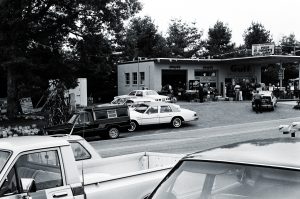
As of March 1st, 2024, Poor Farmers Market in Meadows of Dan has been open 365 days a year for forty years! That is 14,600 consecutive days of grit and fortitude through both the good times and challenging times. Only power outages have interrupted this perfect attendance record. Otherwise, Poor Farmers Market has been a steadfast sentinel for four decades of local and national history.
This impressive achievement is thanks to the determination, personal sacrifice, and hard work of store owner, Felecia Shelor. Through her leadership over the years, the Market has become a community hub, rich in history and fond memories. More than that, Felecia and Poor Farmers Market represent a major force in local development, with many businesses benefiting from her insight, instincts, generosity, and community spirit.
Felecia Shelor is not only a native of Meadows of Dan, but generations before her had also been natives. Her ancestors were even among the first pioneers to settle the area of the Blue Ridge that would later be called Meadows of Dan. Felecia’s parents worked in the elastic plant in Stuart, and her grandparents were homesteaders, loggers, and moonshiners. Carrying on the legacy, Felecia gave birth to a daughter at the age of nineteen. That daughter, Casey, then became the next generation of Meadows of Dan native for the family.
The b uilding that would eventually become Poor Farmers Market was built in 1962 by the A.D. Hopkins Oil Company based in Stuart. The original purpose of the building was to be a Gulf Service station. Between the years of 1962 and 1984, over thirty different people tried their hand at running the business as a full-service gas station and auto mechanic shop. In 1984, it was Felecia’s turn when she leased the building for her produce stand. The new business would be a country store, produce market, a wholesale produce business, and a gas station.
uilding that would eventually become Poor Farmers Market was built in 1962 by the A.D. Hopkins Oil Company based in Stuart. The original purpose of the building was to be a Gulf Service station. Between the years of 1962 and 1984, over thirty different people tried their hand at running the business as a full-service gas station and auto mechanic shop. In 1984, it was Felecia’s turn when she leased the building for her produce stand. The new business would be a country store, produce market, a wholesale produce business, and a gas station.
By the time Felecia was twenty-one, she had already built a sizable wholesale business by peddling produce grown on the mountain to the nearby towns of Cana, Mount Airy, Martinsville, and Danville. Traveling door to door, she visited restaurants, stores, and produce stands, all the while building a clientele of wholesale produce buyers. On the weekends, she set up a produce stand in a parking lot across the road from what is the present-day Poor Farmers Market, near the Parkway in Meadows of Dan. That first small produce stand was such a success that her customers began taking up all of the parking spaces at Meadows of Dan Food Market, the business that had generously allowed her to sell her produce in their parking lot. While she was grateful to the owners of the Food Market, Felecia knew she could not remain in this location. She had too much business for the space. That is when she noticed that the old, abandoned Gulf Station across the road was available to lease.
Things happened pretty quickly, and it wasn’t long after sealing the deal with the owners of the old Gulf station at 2616 Jeb Stuart Highway on March 1st, 1984, that Felecia rang up her very first customer. She would remember this moment forever, as it would end up changing her life.
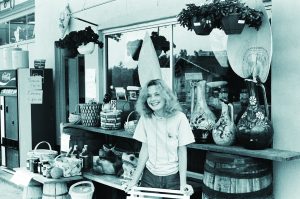
Poor Farmers Market was not very busy in those early years. After all, it can take years for a new business to earn trust in the community. Felecia managed to survive, however, thanks to the extremely busy fall tourist season.
In 1986, however, Felecia was faced with the first in what would become a series of challenges. Mrs A.D. Hopkins, owner of the building, decided to sell the property. She was willing to finance it to Felecia for an eight percent interest rate, but Felecia would have to come up with a down payment. Unfortunately, Felecia didn’t have the money for a down payment, but another buyer did. Harless Webb was buying many of the business properties in Meadows of Dan at the time, including what is now Jane’s Café, Circle M Zoo, and the Dan River Queen. As it turned out, he also wanted to buy the old Gulf Station.
Before Mr. Webb could swoop in, however, Fate decided to smile on Felecia. While crying behind the cash register one morning at the thought of losing her business, Thomas Scott walked in. Felecia had known Thomas all her life, having grown up beside his family home.
She decided to take a chance. The only major asset that Felecia had was her little house on Willis Road. She had invested everything she had in her home and was still making payments on it. Despite the investment in the house, she knew that she had to keep her store. She decided to ask Thomas if he would buy her home. After a brief discussion, Thomas generously decided to purchase the little house on Willis Road, giving Felecia the capital for the much-needed down payment.
Luckily, the old Gulf station came with a small cottage around back. Felecia and four-year old Casey moved into the cottage in January of 1986. It was a tiny house, but they were very happy with it because they could turn up the thermostat for heat. This was a welcome change from the old house where they had to keep a fire going in the old wood stove.
In the 1980’s Poor Farmers Market operated in the old Gulf station. Because it was heated with wood, Felecia had to carry in wood and keep the fire going while running the cash register, making hotdogs, cleaning, doing the paperwork, and everything else that has to be done, all while being a young, single mother raising her child. As a result, Casey grew up in the store.
There was no money and no time to do anything but work. Felecia worked twelve hours a day, seven days a week, and Casey was there with her every day until she was old enough to stay in the little cottage by herself. It was a fine arrangement. Felecia could slip out back to check on her daughter in between customers. Casey could also come to the store to be with her mother anytime she wanted.
The store started out carrying groceries, garden seeds, fertilizer, potting soil, snacks, drinks, hotdogs, fuel, kerosene, freshly popped popcorn, pottery from Mexico, and all the souvenirs and treats that most country stores usually sold. There was a busy plant season in the spring and a huge produce business in the fall. During this time, Felecia also leaned into specialty, hand-made products provided by local artisans and farmers.
Tella Mae Cockram, who was in her seventies, made apple butter in the Fall at Poor Farmers Market. She also grew cane and made molasses at her farm. She, along with many other locals, brought their eggs and farm products to sell at Poor Farmers Market. Many women made things in their homes like chow chow, jams, and jellies. Raw cider was also a big commodity in apple season. Trends changed rapidly, however, with the rise of the big corporations like Walmart and Lowes Hardware in the 1980’s. Small country stores like Poor Farmers Market could not compete with the big corporations in terms of price. On top of that, new regulations in the 1980’s began requiring government inspections for homemade consumable products. At the time, many of the mountain people chose to go out of their “cottage” or small farm businesses because they didn’t feel comfortable with government inspectors entering their homes to perform the inspections. As a result, the locally made food products available at Poor Farmers Market dwindled dramatically. Still, Felecia muddled through.
That is, until the next challenge came over the horizon. Or, in this case, over the east coast of the Carolinas. 1989 was a hard year for Poor Farmers Market as Hurricane Hugo took down the apple butter shed on its way through the Blue Ridge. There was flooding in the storage room, which was once the old service station’s grease pit. Hundreds of dollars’ worth of merchandise and supplies were ruined. In addition to this catastrophe, Felecia would lose even more money that year after being misled by an unscrupulous molasses vendor.
Despite the hardships of 1989, Felecia literally weathered the storm and Poor Farmers Market survived. Not only survived, it bounced back so well that in 1993, Felecia put both her store and home up for collateral and borrowed $50,000 from the bank to expand.
$50,000 was a huge amount of money for someone in Felecia’s economic world in 1993. Thanks to this leap of faith, however, Poor Farmers Market tripled in size. Felecia added a kitchen and deli, some additional retail space, an office, and a big storage area to the back of the store. Poor Farmers Market took a new turn that year, with a much bigger food service operation, an increased focus on gifts and unique products, and an expansion of country foods and locally made products for locals and tourists.
The 1990’s was a decade of extreme prosperity for Poor Farmers Market and for Felecia personally. In those years there was still manufacturing in Patrick County. Poor Farmers Market was open at five o’clock every morning to serve breakfast to workers on their way to the job. There was an influx of retirees and second homeowners who were buying land and building houses because of the area’s natural beauty, as well as low property taxes. All of the new residents were very supportive of Poor Farmers Market. The tourists were learning about this unique little shopping opportunity in the mountains and were flocking in by the thousands to buy bushels of apples, cabbage, and potatoes in the fall.
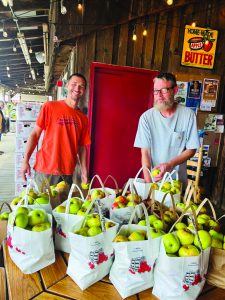
It was still a time when people took great pride in their work, and Poor Farmers Market is the success it is today because of the caliber of employees Felecia was able to hire. Each employee brought their own unique talents and qualities to the now-iconic store. Poor Farmers Market absorbed all the qualities and attributes of every person who ever worked there, and each one contributed in their own unique way to the business. They helped to steer the course for the future of the country store. When Casey turned fifteen in 1997, she began officially running the front cash register, Casey’s best friend, Terri Scott, also came on board and worked in the deli.
With Casey on the register and Terri in the deli, the two of them would often run the store on their own. What ethical and responsible young ladies! At night, after closing the store at ten o’clock, the two of them would sit on the porch together in the warm summer air, feeling good about themselves for what they were able to do. They felt strong and independent and trustworthy.
In 1993, also at the age of fifteen, Trinity Goad came to work at Poor Farmers Market. Neither Felecia nor Trinity knew at the time what a key and indispensable asset Trinity was to become. Recognizing his value and his skill, Felecia would eventually give Trinity the job of General Manager in 2004.
During the 1990’s period of growth for Poor Farmers Market, Felecia found herself at a trade show in Charlotte. While there, she happened to walk by an exhibit that displayed a cute stuffed cat pouncing on a cute stuffed mouse. She felt drawn to the display and decided on the spot to purchase some of the stuffed animals to sell at Poor Farmers Market. Little did she know that purchase would be a historic commercial game changer. The manufacturer was Ty, Inc., the manufacturer of Beanie Babies. Poor Farmers Market was connected to Ty when the Beanie Babies craze exploded because of that purchase at the trade show. Poor Farmers Market made $150,000 profit on Beanie Babies, selling them retail, as well as wholesale to other businesses. This was especially impactful because Felecia had been trying to save for Casey to go to college but hadn’t gotten far with savings due to the cost of running the store. Casey’s education at Wake Forest was almost $150,000 at the time, and Beanie Babies ended up paying Casey’s way through her first four years as an undergraduate.
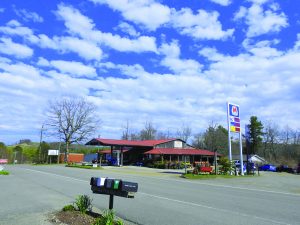
In addition to growing Poor Farmers Market, Felecia decided to invest in other businesses during the final decade of the twentieth century. With the help of her lifelong neighbor, friend, and local contractor, Buford Wood, she began to buy and sell real estate. As her wholesale produce business had outgrown its space by the 1990’s, Felecia chose to let that part of the business go and devote more time, energy, and investment to her real estate efforts. It was a time of great prosperity that would not have happened if not for the help of Buford Wood.
Buford is one of the souls who contributed to Poor Farmers Market to such an extent that it would not be what it is today without him. He was the local contractor who built the addition to the back of the store in 1993. Buford didn’t finish fifth grade, but he was one of the most intelligent people Felecia ever knew. He designed the addition in his head, without the contribution of an architect or architectural drawing, and built it in a way that Felecia could afford. Buford passed away unexpectedly in 2007. Buford’s impact on the store and Meadows of Dan as a whole cannot be overstated.
Caught up in the enjoyment of the busy and prosperous years of the 1990’s, Felecia was mentally unprepared for the challenges that would change her world in the year 2000. With Casey’s high school graduation approaching, it was time to begin talking about college. It was during the graduation ceremony at Patrick County High School, an outside ceremony on a day of scorching and record heat, that it hit Felecia like an asteroid. Casey would be leaving. Life would never be the same. Felecia wept through the entire graduation ceremony because she was suddenly and acutely aware that her little girl was leaving home. It had always been just the two of them.
When Casey left for college in the Fall of 2000, the plan was for her to have the college experience, see the outside world a little, and eventually come back to Meadows of Dan. It was Felecia’s intention to give Poor Farmers Market to Casey, with Casey and Trinity running the business together. She envisioned working part time at the Market while prioritizing time on her farm with her gardens and animals. While Casey was at college, Felecia also developed a cabin rental business, and had begun to dedicate additional time to it. Plans were set and the future was looking bright.
Totally unbeknownst to both Casey and Felecia, however, destiny had other plans. During her college years at Wake Forest University, Casey discovered she had a higher calling…to become a medical doctor.
Despite this significant wrinkle in the plans, Trinity and his staff ran Poor Farmers Market like a well-oiled machine during the first decade of the new millennium. Business was good and there were no major crises. Felecia still worked at Poor Farmers Market, but she began focusing more and more on other things. For six years, she attended a Bible College at night in Winston-Salem. She also worked extensively for peace in the Middle East, making thirteen trips to the Holy Land. Then, of course, there was also her farm life.
Eventually, Casey graduated from Wake Forest and received a degree in Biology with a minor in Chemistry. She remained in Winston-Salem for two years, working at Wake Forest in medical research before being offered a full scholarship to attend medical school at the University of North Carolina at Chapel Hill.
During this time, 1996, Felecia met a wonderful man named Dan Rodriguez, and planned to marry him. They had met at the Poor Farmers Market. Unfortunately, Felecia would lose him to a motorcycle accident in 2003.
Casey however would go on to meet a wonderful young man named Tim Davis from Floyd County. Tim had moved to Winston-Salem for his first teaching position. Casey and Tim married in the summer of 2007.
The first decade of the new millennium saw Poor Farmers Market running well, with Felecia branching out in business and personal growth. Starting with 2010, even more changes were in store. In the spring of that year, Casey gave birth to her daughter, Rain and began preparing to enter a three-year emergency physician residency at Wake Forest Baptist hospital in Winston-Salem. To be a more supporting mother and grandmother, Felecia made the hard decision to stop traveling to the Middle East. Following this major shift in Felecia’s world, Poor Farmers Market would face some of its greatest challenges yet.
In 2012, a neighbor approached Felecia to ask her to purchase the building that housed Jane’s Country Café. The owner of the building had moved to Florida, and neighbors were afraid that someone would buy the building and kick Jane’s Café out. They wanted Felecia to buy the property so Jane’s Cafe could have the security to remain. Felecia saw that if she bought the property, she could open it up in a way that would also create more parking for Poor Farmers Market, which was sorely needed. In the end, she purchased the property and Jane’s Country Café continued to operate.
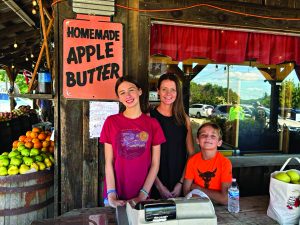
Soon after the purchase of that land, Felecia would receive a call from the state Department of Environmental Quality. There had been a report of a long leaking gas tank from a nearby property. As a result, all of the wells on the south side of Highway 58 were contaminated. The State DEQ immediately stepped in to ensure public safety by installing massive carbon filtration systems. However, the DEQ told Felecia that this was a temporary solution. The community would have to find and develop a clean water source in order to continue business in the area.
Felecia knew how serious the situation was, having experienced a failed sewage system before. When she originally purchased Poor Farmers Market, the sewage system was in the yard of the cottage behind the store. The sewage for the Parkway Restaurant, now Jane’s Country Café, was on the same system. The day came when the existing sewage system could no longer handle the volume of sewage, and especially the grease that was coming from The Parkway Café. The sewage rose to the top of the ground, a clear public safety hazard.
Being a wise businesswoman, Felecia was able to avert that crisis in 1991 by purchasing a tract of land next door and building a new and much larger sewage system. The project cost her $30,000 in 1991, which was an enormous amount of money for her at that time. Years later in 2001, Felecia bought fifteen acres between The Meadows of Dan Community building and Nancy’s Candy for the purpose of addressing the sewage crisis in Meadows of Dan. She purchased the building that houses Jane’s Café with the intent of building a new sewage system for it on her fifteen acres. Nancy, of Nancy’s Candy Company, generously gave Felecia a utility easement in order to install a sewage line through the back of Nancy’s Candy to move the sewage from Jane’s Café to Felecia’s property on the other side of Nancy’s Candy.
Felecia then hired an engineer to design the system. He told her it would cost $20,000 to build the sewage system that he would design for Jane’s Café. Felecia agreed to build the sewage system but in the process of designing it, the engineer discovered that a new government regulation had just been enacted. The new regulation required a sewage treatment facility. As a result, the cost of the project jumped to $200,000 dollars.
Regarding the current crisis, in 2016, the Meadows of Dan Community Association convinced the county government to apply for a grant to build a sewage system for Meadows of Dan and a $30,000 planning grant was awarded to Patrick County. Unfortunately, no one involved had the expertise to design a large sewer system. Because of this, the county employees decided to use the grant money to build sidewalks in Meadows of Dan. The proposed sidewalks would contradict new requirements for parking given by VDOT and would greatly reduce available parking for businesses. Eventually, after years of efforts, the county board of supervisors decided not to install the sidewalks.
Felecia believed that the community could survive these hardships, but a hard fight would be necessary. The state DEQ’s plan to resolve the water crisis in Meadows of Dan was to develop a new water system for the entire business community and to give that water system to Patrick County to operate. The administration of Patrick County refused to take ownership of a new water system because of the high cost. Felecia fought hard, asking the County for help. For the next six years, she continued to ask the DEQ and Patrick County for a permanent solution to the problem. Miraculously, in the end, Poor Farmers Market was given a much better well than it had before the crisis.
In 2018, Felecia, Casey, and son-in-law, Tim Davis, created Concord Corner Store in an old, neglected building off of Highway 58, close to the Blue Ridge Parkway. The building which housed Concord Corner Store had been falling into disrepair. Felecia, Casey, and Tim purchased the property after it sat empty for years. Concord Corner Store carries a different line of merchandise from Poor Farmers Market and features the work of local artists. One-hundred potters, jewelers, quilters, woodworkers, and crafters, sell their products at Concord Corner Store. The store also carries unique, high-quality clothing, jewelry, handmade porch furniture, and gifts. Concord Corner Store is a tremendous success.
In 2020, the owner of the building across the road from Concord Corner Store, formerly Christmas in the Meadows and Meadows Mercantile, approached Felecia and Casey to ask them to buy her building. She’d had it on the market for ten years, but it had never sold. Coincidentally, Felecia and Casey had already discussed the idea of purchasing the building, and the price the property-owner quoted was exactly the amount that they had hoped for. After deliberation, Felecia, Casey, and Tim decided to buy the property. They hoped to find new tenants for the building, ones that could bring new businesses to Meadows of Dan. Today there are five new businesses in the old mercantile building. Along with Concord Corner Store, these new businesses have brought new life and light to the community of Meadows of Dan. Primitive Coffee, Country Road Realty, Bhagini Yoga Studio, MoD Salon, and Rivian electric car charging stations are located on the property at 2577 Jeb Stuart Highway.
2020 was a crucial year for businesses all over the country and it would bring many changes to Poor Farmers Market. Before Covid, the iconic country store opened every day from five in the morning till ten o’clock at night. Due to pandemic restrictions and an evolving shopping culture, the hours for the store were changed to open at six and close at eight.
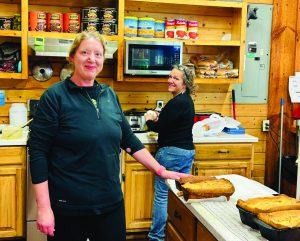
Local economic factors also played a part in these changes. Many businesses in the area had enjoyed consistent patronage from factory workers. With the factories closing and jobs being relocated, some businesses had to adjust.
The lockdowns of 2020 would also prove to be a challenge. Felecia didn’t know exactly what to do, but she knew she needed to keep Poor Farmers Market open. The hard work and determination of Felecia and her valued staff ensured that her store survived the lockdowns. In fact, the amount of business that came in through 2023 was three to four times the amount previously experienced. After surviving the lockdowns, Felecia then had to figure out how to handle inflation. Costs were going up everywhere, especially affecting food and service industries. This challenge is currently ongoing, but Felecia is nothing if not resourceful.
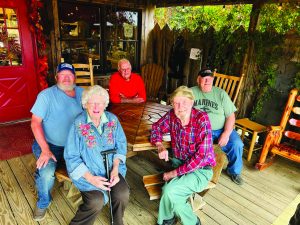
After forty years, Felecia has more than proven herself. Starting out as a single mother of humble means, she rose to the challenge and became a smart, dedicated, determined, and very successful businesswoman. She not only forged success for herself and her family, but through her insight, generosity, and sheer will, she also helped other businesses to overcome obstacles and survive. She made it possible for new businesses to find a home in Meadows of Dan and to thrive there. Felecia Shelor is truly a community hero and has become a strong pillar for the area. If Felecia had not made all the decisions she made…if she hadn’t made all the property purchases, or if she hadn’t provided an outlet for local producers and artisans, or if she hadn’t fought so hard for safe water, the business offerings in Meadows of Dan would certainly look very different. One thing is for certain, though, there is a small section of Jeb Stuart Highway in Meadows of Dan that looks the way it does, and is flourishing like it is, because of Felecia Shelor.
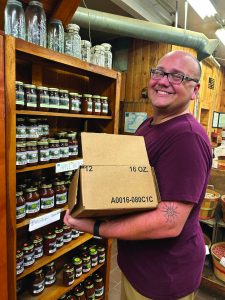
Poor Farmers Market is proof of her capabilities, having long ago become a valued asset to the community. The management there truly cares about the Meadows of Dan community, regularly helping their neighbors when able. Trinity, Casey, Tim, and Felecia make a powerhouse of a management team.
Felecia will turn sixty-two this year. She would like to work less, stress less, and focus less on business and more on her farm life and family. Felecia’s grandchildren, Rain and Banner, are growing up in the store just like their mother did. The plan is to keep the business going so that Rain, Banner, and others who want to live in Meadows of Dan will have the opportunity to make a living. The most important thing to the owners, managers, workers, and all who love Poor Farmers Market is that they are able to preserve the simple way of life found in Meadows of Dan, the life they all share together.
Poor Farmers Market • Felecia Shelor
2616 Jeb Stuart Highway, Meadows of Dan, VA
276-952-2670
